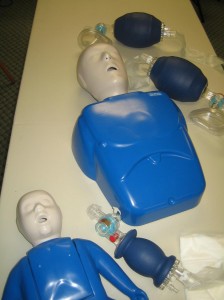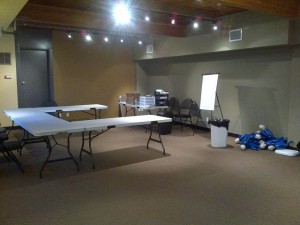When you train in CPR, you’ll find that there are basic programs and advanced programs. Basic courses can be taken by lay people – people who aren’t in healthcare – as well as healthcare providers (HCPs). Advanced programs on the other hand, can only be taken by HCPs. If you work in healthcare or study in an allied health program, you can take one of our two ALS (Advanced Life Support) programs. However, we will require you to have a valid BLS for HCPs training certificate and a passing grade on the written exam given before training.
Studying Advanced Life Support

Advanced Life Support programs take up last all five links in the Chain of Survival ([1] recognition, [2] chest compressions and rescue breaths, [3] defibrillation, [4] advanced life support, and [5] post-cardiac arrest care). BLS classes typically only cover the first two, and the third if an AED is available. Medical management is an intergral part of ALS rescue, from medication administration to diagnostics.
The Chain of Survival is part of the Basic Life Support guidelines, created by the AHA as a guide to rescuers giving CPR. If a patient goes into cardiac arrest (a “code”) in an organized, medical setting, you can see all five links used by healthcare providers. In a non-medical area, rescuers can either go through the first two or first three links with proper CPR training.
- Advanced Cardiac Life Support – healthcare providers, 16 hours (2 days) (re-certification 5-6 hours)
- Pediatric Advanced Life Support – healthcare providers, 14 hours (2 days) (re-Advanced Cardiac Life Support (6-8 hours)

An ACLS program lasts two days and teaches trainees about the management of adult patients. This is the main different between ALS and BLS training. Basic courses teach students about basic CPR skills (compressions, rescue breaths, and defibrillation) while advanced courses teach students about medical management. Medical management covers medication administration, use of medical equipment, and diagnostic procedures to manage a case of cardiac arrest.
Certification, validity, and renewal
An ACLS certificate has a validity period of two years before it expires. We advise students to strictly comply with the application to re-certification classes before the credentials expire. If the student lets his or her certificate expire, he is no longer qualified for re-certification training and he or she will have to take the training program. Re-certification is much shorter than the training program for ACLS (16 hours) because it is only five to six hours long.
Re-certification is only offered for five of our training courses: Basic Life Support (for HCPs), ACLS, and PALS courses. Once you have completed the re-certification class, you will get a renewed training credential valid for an additional two years.
Enrolment
If you want to sign up for ACLS training with us, you can visit any of our location pages or their websites and sign up through the online application form. The form is available all day and can be filled out 24/7. You can also e-mail, call, or visit us in person to apply for training.